牛津译林版九年级上Unit 4 Growing up 状语从句课件(99张PPT)
文档属性
| 名称 | 牛津译林版九年级上Unit 4 Growing up 状语从句课件(99张PPT) |  | |
| 格式 | pptx | ||
| 文件大小 | 11.7MB | ||
| 资源类型 | 教案 | ||
| 版本资源 | 牛津译林版 | ||
| 科目 | 英语 | ||
| 更新时间 | 2020-12-24 14:27:01 | ||
图片预览



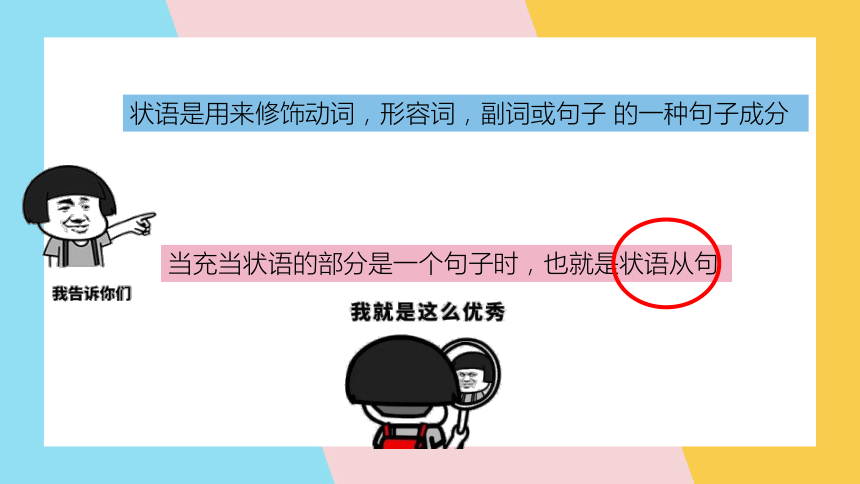
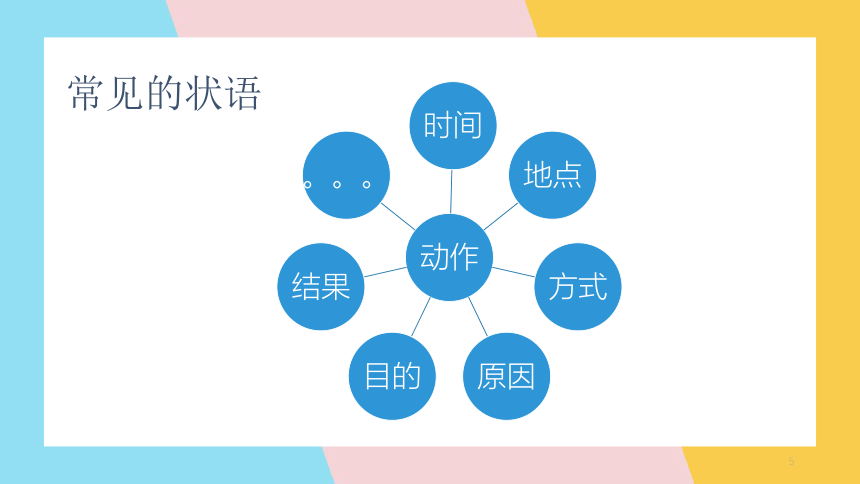
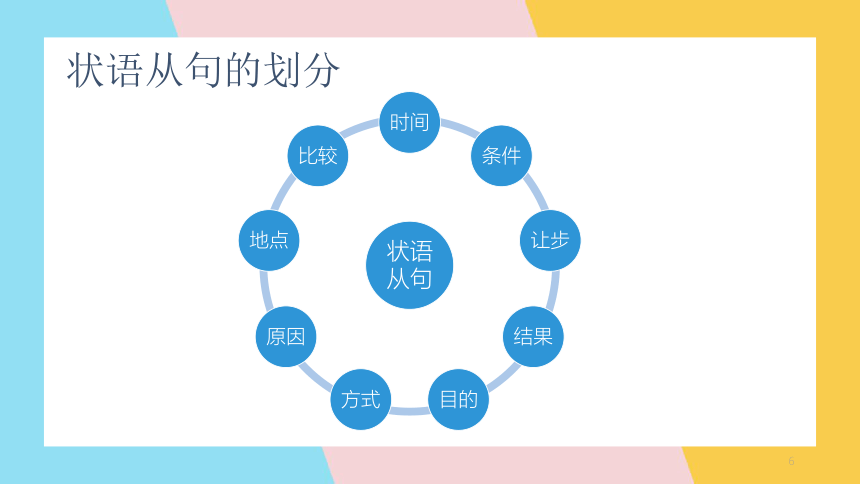

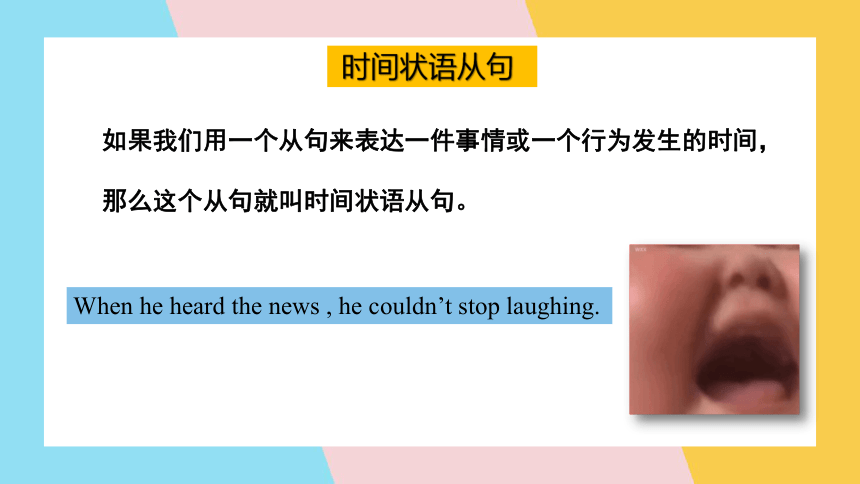
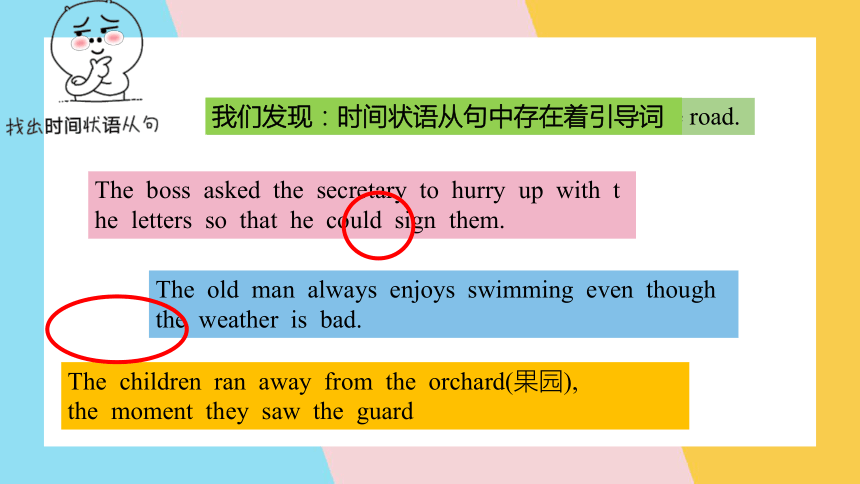

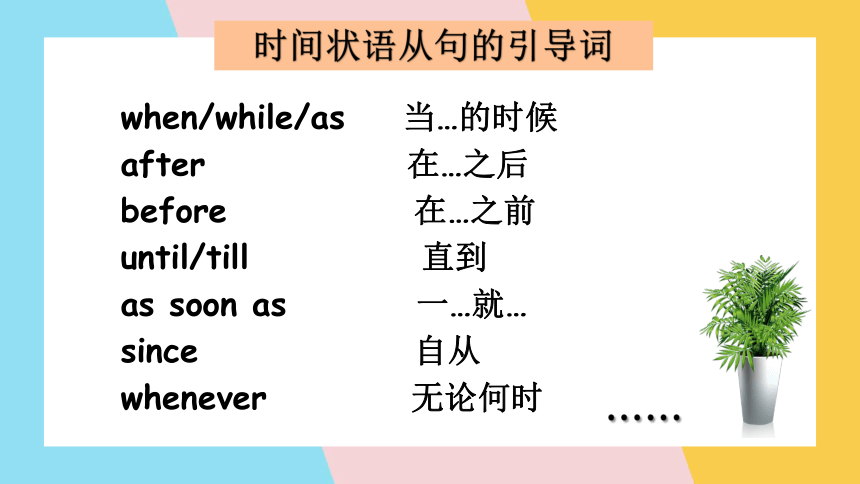
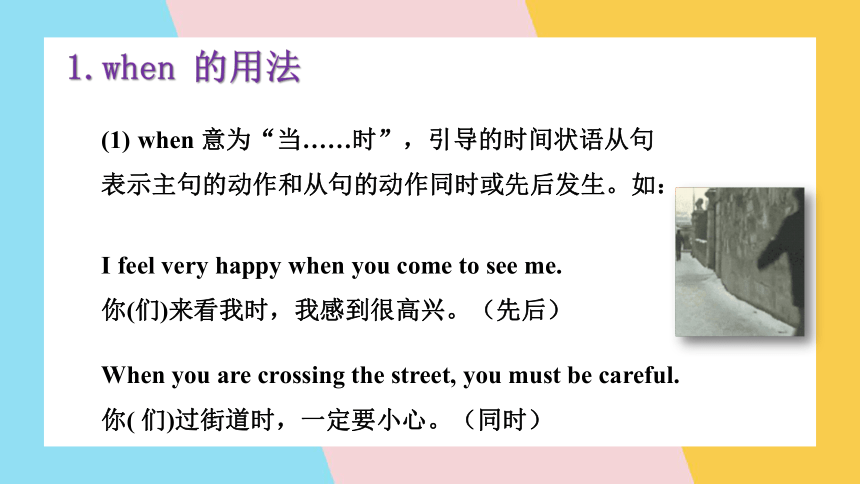
文档简介
状 语 从 句
英语课程
XX老师
状语从句
概念导入
状语是用来修饰动词,形容词,副词或句子 的一种句子成分
当充当状语的部分是一个句子时,也就是状语从句
常见的状语
5
状语从句的划分
6
时间状语从句
时间状语从句
如果我们用一个从句来表达一件事情或一个行为发生的时间,那么这个从句就叫时间状语从句。
When he heard the news , he couldn’t stop laughing.
You must be careful when you are crossing the road.
The?boss?asked?the?secretary?to?hurry?up?with?the?letters?so?that?he?could?sign?them.?
The?old?man?always?enjoys?swimming?even?though?the?weather?is?bad.????
The?children?ran?away?from?the?orchard(果园),?
the?moment?they?saw?the?guard
我们发现:时间状语从句中存在着引导词
时间状语从句
引导词
时间状语从句的引导词
when/while/as 当…的时候
after 在…之后
before 在…之前
until/till 直到
as soon as 一…就…
since 自从
whenever 无论何时
……
when 意为“当……时”,引导的时间状语从句
表示主句的动作和从句的动作同时或先后发生。如:
I feel very happy when you come to see me.
你(们)来看我时,我感到很高兴。(先后)
1.when 的用法
When you are crossing the street, you must be careful.
你( 们)过街道时,一定要小心。(同时)
(2)when 引导的时间状语从句中,可以用延续性动词,也可以用短暂性动词。如:
Someone knocked at the door when I was sleeping.
当我正在睡觉时,有人敲门。(延续性动词)
I will visit my good friend when I arrive.
当我到达时,我将去看望我的好友。(短暂性动词)
while 意为“当……时引导的时间状语从句表示主从句的动作在
同一时期发生,常用延续性动词或表示状态的词。如:
They rushed in while we were discussing problems.
当我们正在讨论问题时,他们冲了进来。
Father was cleaning the car while I was playing computer games.
(while表示两个动作同时发生)
当我正在玩电脑游戏时,爸爸正在清洗汽车。
2.while 的用法
注意:while 也可以作并列连词,表转折的关系,
相当于but,译为“然而”。如:
I like listening to music, while my brother likes doing sports.
我喜欢听音乐,而我的兄弟爱好运动。
as 表示“当…时”、“一边…一边…”,
强调主语的动作与从句的动作同时发生,如:
As she was dancing , her father was watching TV.
3.as 的用法
It’s getting colder and colder as the winter comes.
1.while的用法:
(1)while引导的从句的谓语动词必须是延续性的
(2)强调主句和从句的动作同时发生(或者相对应)
(3)while有时还可以表示对比。
区别:由when ,while ,as引导的时间状语从句
2.when的用法
when 引导的从句的谓语动词可以是延续性的,也可以是非延续性的。
3.as的用法
as 一般强调动作的同时发生,解释为“一边…一边…”
1.I was watching TV ________ my brother was writing an email at home at this time last night.
A.as soon as B.after C.when D.while
2.I was cooking ______ I heard someone knocking at the door.
A.as soon as B.when C.until D.while
3.Rose was doing her homework ______ the bell rang.
A.as soon as B.when C.until D.while
√
√
√
引导词when & while 练一练
before 意为“在……之前”
after 意为“在……之后”
区别:由after和before引导的时间状语从句
1.Laura went to school by bike ________she had breakfast at home.
A.when B.after C.before D.while
2.Please take the medicine _________ you go to bed.
A.when B.after C.before D.while
3.We should wash our hands _______ we have meals.
A. after B. before C. when D. since
√
√
√
引导词after & before 练一练
肯定时,用till/until, 表示一个动作一直持续到某一个时刻
“直到…”
He slept till/until it was nine next day.
2. 否定时,只能用until。即 not……until……
“直到…才…”
They didn’t go to sleep until it was twelve o’ clock.
区别:由until和till引导的时间状语从句
1.—What do you think of Zhangjiajie?
—Excellent!You won't realize how fantastic it is _____ you visit it.
A.when B.till C.after D.until
2. Dale didn't go to bed _______ he finished his homework last night.
A.before B.till C.after D.until
3. I will wait for him here ______ he comes back.
A.before B.till C.after D.when
√
√
√
引导词 till & until 练一练
since引导的时间状语从句
返回
since 意为“自从。。。”,表示主句的动作从过去某个时间开始一直延续到现在,所以主句必须用现在完成时,since从句用一般过去时。
1.I haven't heard from Jenny _________ she left Xiaodian Middle School.
A.before B.after C.when D.since
—Long time no see!
—Oh! It ________ five years since we met last time.
A. was B. were C. has been D. have been
√
√
时间状语从句一般用when提问,但是since用how long
as soon as引导的时间状语从句
返回
as soon as 意为“一……就……”,表示从句的动作一发生,主句的
动作马上就发生。
1. I will call you _________ I get to Beijing.
A.before B.while
C.since D.as soon as
I will do some cleaning as soon as I________ my homework. A.finish B.will finish
C.has finished D.finished
√
√
whenever 引导的时间状语从句
whenever 意为“每当;任何时候,可以用every time 替换
Whenever he has time , he likes playing football with his friends.
每当他有时间的时候,他喜欢和他的朋友们踢足球。
1、I always drink coffee when I work.
2、When he gave me a present, I thanked him.
3、We will go out for a walk when the weather is fine。
主现从不限
主过从过
主将从现
时间状语从句的时态
注意since用现在完成时
注意:遵循主将从现原则的时间状语从句有
as soon as ,when , until
1.Aunt Lucy will tell us something about her trip to Australia when she ______back.
A. came B. comes C. would come D. will come
2. They won't go home until they _______ their work.
A. finish B. will finish C. finishes D. has finished
3. We will have the party if the weather ______ fine.
A.will be B. is C. are D. was
√
√
√
条件状语从句中的 if
一、 填空。
1. I will phone you as soon as Jack _______ (come) back from London.
2. The bell rang while Lily _____ (read) a magazine.
3. He went to bed after he _______ (finish) his homework.
4. He didn’t stop to have a rest ______(直到) he finished his work.
5. My son was playing computer games _______(当….时候) I was cooking.
comes
was reading
finished
until
while
时间状语从句随堂练
二、根据汉语完成句子
1. 明天他一回来,我就告诉他这个消息。
As soon as he _______ back tomorrow,I ______ _____ him the news.
2.当我在做作业的时候,大明正在看电视。
_______ I was doing my homework,Daming _____ ________ TV.
3. 汤姆完成那项工作后将去游泳。
Tom will go swimming _________ he _______ the work.
While
comes
was watching
will tell
after
finishes
时间状语从句随堂练
三、用括号内单词的适当形式填空
1.The boy ________(do) his homework when his mother called him.
2.I ______(go) to Beijing for my summer holiday when this term ____(be) over.
3.He will be excited as soon as he ____(get) to the Great Wall tomorrow.
4.Usually,my mother________(cook) while my father_________(read)news.
5.She _______(buy) me a CD if I like music.
6.We often _____(go) home together after the school finished.
was doing
will go
is
gets
is cooking
is reading
went
will buy
时间状语从句随堂练
时间状语从句
真题练
—It has been much easier for me to go to work ____shared bikes appeared.
—But they also caused plenty of problems.
A.
since
B.
before
C.
unless
D.
though
真题再现
Yesterday, I ____________ the subway home when I suddenly found I was on the wrong line.
A
took
B
was taking
C
had taken
真题再现
Tony was drawing a picture ____________ I was doing my homework.
A. if
C. while
B. because
D. until
真题再现
I will call you as soon as he ____________ here.
arrive
A
arrives
C
will arrive
B
arrived
D
真题再现
—Do you know when Mrs. White ____ for dinner this evening?
—No, but I think she _____when she is free.
A. will come; will come
B. will come; comes
comes; will come
真题再现
—I want to know if he ____________ back tomorrow.
—I’ll call you as soon as ____________
A. will come; will return
B. will come; returns
C. comes;
will return
真题再现
It is known to all that the day becomes shorter and shorter ____________ winter comes.
A.
before
B.
when
D.
since
C.
until
真题再现
I won’t go home ____________ the rain stops.
A. since
B. when
C. until
真题再现
时间状语从句
模拟检测
— Could you tell me when he ____________ back?
— Sure. He will come back as soon as he ____________ the classroom.
B. will come; finishes cleaning
C. will come; will finish to clean
A. comes; will finish cleaning
模拟检测
Mr. Liu has taught us English ____________ he came to our school.
A. until
B. because
C. though
D. since
模拟检测
It’s five years ____________ we met last time.
A.
for
B.
when
C.
since
D.
if
模拟检测
_____ I saw the delivery man(快递员)cycling towards me,
I knew that was my gift.
A
A. As
B. Although
C. Before
D. While
模拟检测
原因状语从句
原因状语从句概念导入
复合句中表示动作发生原因的句子即为原因状语从句
典型例句
He didn’t come to school because he was ill.
As it is raining, we shall not go to the zoo.
Since you can’t answer the question, I’ll ask someone else.
常见连接词列表
{5C22544A-7EE6-4342-B048-85BDC9FD1C3A}连接词
语气
位置
(主句前/后)
意义
because
最强
前或后
“原因”;表客观因果关系。
as
较强
前
“由于”;把众人所知的事实当作理由。
since
较弱
前
“既然”;就对方陈述的事实作为理由。
易错点1
— Why are you late again?
— Because there is something wrong with my bike.
because常回答why引导的疑问句,从句一般位于主句后;why引导的问句,从句一般位于主句前。
易错点2
because和so不能同在一个句子中。
Because I was afraid, I didn’t go there.
Because I was afraid, so I didn’t go there.
易错点3
because和because of也有明显区别。
Because 后面要跟从句,而 because of 后面跟名词短语
He is late for school because it rains heavily.
He is late for school because of the heavy rain.
1. I danced in front of the people _________ I liked it.
2. ____ he was not well, I decided to go without him.
3. ______ everybody know about it, I don’t want to talk any more.
because
As
Since
because ,since ,as 填空
条件状语从句
复合句中表示主句动作发生条件的句子即为条件状语从句
典型例句
You will get good grades if you study hard.
条件状语从句概念导入
条件状语从句分为“真实条件句”和“非真实条件句”
初中阶段我们主要学习“真实条件句”的用法
条件状语从句的连接词
if
如果,假如
unless
除非,如果不
unless = if … not
注意:当某种条件引起的结果是一种情绪或想法时,不能用unless 只能用 if … not
比如:If I was not invited to the party , I will be very angry.
易错点1
“主将从现”:条件状语从句要用一般现在时态表示将来的动作。
If it doesn’t rain tomorrow, we’ll go to the park.
如果明天不下雨的话,我们就去公园。
(从现)
(主将)
条件状语从句的时态
易错点1
“主情从现”:条件状语从句中的主句可能是情态动词(can, may, might, must, should) + 动词原形的形式。
If you want to pass the exam, you must study hard.
如果你想考试及格,你就必须努力学习。
(从现)
(主情)
条件状语从句的时态
易错点1
“主祈从现”:条件状语从句中的主句可能是祈使句。
If you see him, please give him this note.
如果你看见他,把这个纸条给他。
(从现)
(主祈)
条件状语从句的时态
易错点2
{5C22544A-7EE6-4342-B048-85BDC9FD1C3A}意为“如果”
意为“是否”,= whether
引导条件状语从句。
引导宾语从句。
遵循“主将从现”“主情从现”
“主祈从现”原则。
无此用法。
If you wants to see him, you can tell him to wait.
如果你想见他的话,叫他等好了。
I wonder if I should wear a hat.
我不知道是否应该戴帽子。
if 的用法对比
【典例1】用动词的正确形式填空。
1. If she ____ (be) kind to me , I __________(not argue) with her.
2. I want to know if he ________(come) tomorrow, if he _________(come), I __________(give) the massage to him.
is
won’t argue
will come
comes
will give
条件状语从句典型例题
【典例2】—Lucy, what about going camping if it ______ tomorrow?
—Sounds great!
A. didn’t rain B. doesn’t rain
C. rains D. won’t rain
条件状语从句典型例题
【典例3】If there ______ no buying and selling of animals,
there ______ no killing in nature.
A. is; will be B. will be; will be
C. is; is D. will be; is
条件状语从句典型例题
Practice
1.You'll be late_____you don't get up early tomorrow morning.
A.if B.when C.before D.until
2.If you_____him tomorrow, please ask him if he____to work on the farm with us.
A.see; goes B.will see; goes
C.will see; will go D.see; will go
3.You can’t learn it well _______ you work hard.
A. unless B. if C. since D. because
√
√
√
让步状语从句
让步状语从句概念导入
让步状语从句表示即便出现从句中的情况,主句动作仍然会发生
典型例句
I will try it , although I may fail.
Though he did not have much money , he was still happy.
“有退一步说…”的意思
让步状语从句的连接词
although
尽管,虽然
though
尽管,虽然
这两个连词意思大致相同,在一般情况下可以互换使用。
在口语中,though较常使用,although比though正式,
二者都可与yet,still连用,但不能与but连用。
易错点
though, although 表示“虽然;尽管;即使”之意
结果状语从句
结果状语从句概念导入
结果状语从句用来补充说明主句动作发生所带来的结果
典型例句
The boy is so young that he cannot go to school.
It is such nice weather that I would like to go to the park.
结果状语从句常由so… that或such…that引导
掌握这两个句型,首先要了解so 和 such与其后的词的搭配规律。
1、such 是形容词,后面+名词或名词词组
2、so 是副词,后面+形容词或副词
3、so 还可与表示数量的形容词many, few, much, little连用,
形成固定搭配。
结果状语从句的引导词
在否定句结构中
so … that … 可以用 too … to 或 be not …enough to do替换
结果状语从句的转换
在肯定句结构中
so … that … 可以用 be …enough to do替换
结构分析
1)so + adj + that从句
eg:It was so cold outside that we had to stop the game.
2) so + adv + that从句
eg:Tom ran so fast that he won first place.
结构分析
3) so + many/much/few/little(少) + 名词 + that从句
eg:There was so much work to do that Mary got tired.
4) such+a+形容词 + 名词 + that从句
eg:It was such a cold day that we had to stop the game.
so … that 的特殊用法
so … that 可以用在单数可数名词前
典型例句
She is so beautiful a girl that everyone likes her.
She is such a beautiful girl that everyone likes her.
结构为: so + 形容词 + a + 名词 + that
= such + a + 形容词 + 名词 + that
根据句意,用so或such填空。
?
1.?The?boy?is_____?young?that?he?can't?go?to?school.?
?
2.?He?told?us?_______?a?funny?story?that?we?all?laughed.?
?
3.?He?has?____few?books?to?read?that?he?has?to?borrow?
some books?from?the?library.?
4.?It?is_____?a?tall?building?that?I?can't?see?its?top.?
?
so
such
so
such
1. His mother was _______ busy ______ she can’t look after Tom.
A. so, that B. such, that C. very , that D. too, to
2. He was ______ angry that he couldn’t say a word.
A. so B. too C. very D. much
√
√
Practice
3.There is ____ little money that I can’t buy the shirt.
A. such B. so C. much D. many
4.He was ____ a little boy that everyone takes care of him.
A. so B. such C. many D. much
√
√
Practice
目的状语从句
目的状语从句概念导入
目的状语从句用来说明主句动作发生的目的
典型例句
Say it louder so that everyone can hear you.
We will come at eight in order that the meeting can begin early.
引导目的状语从句常用的连词有:
so that(以便), in order that(为了;以便)
so that 和 in order that 可以进行替换
目的状语从句的引导词
【注意】in order that与in order to的区别:
in order that+从句
in order to+动词原形 (叫目的状语)
易错点
状语从句
综合练
状语从句分类练习
一、单项选择题
1.The lazy boy didn't go to school yesterday______
he could play computer games at home.
A.to B.so that C.such that D.in order to
2.We will go to the supermarket _______some food.
A.so that to buy B.so
C.in order to buy D.in buying
3.Could you keep silent_______we can do some reading quietly?
A.so that B.that C.to D.so
√
√
√
4.He is __ strong __ he can carry the big stone.
A.such;that B.so;that
C.such a;that D.such an;that
5.______he fell off his bike,____he hurt his leg.
A.Because;so B./;because
C.Because;/ D./;
6.He is_______a weak old man that he can`t
get up by himself.
A.such B.so C.too D.very
√
√
√
7.____she is ill all the time,____she never gives up her study.
A.Although;but B.But;/
C.Although;/ D./;/
8.She was______tired that she couldn't go to work .
A.so B.such C.too D.very
9.He plays basketball so ______ that we are all proud of him.
A.good B.well C.better D.best
√
√
√
二、词型练习
1.He ran so_________(quick/quickly) that we couldn`t caught him up.
2.He is too young _________(look/to look) after himself.
3.It is such a______(fun/funny) story that everyone all laugh.
4.The flowers are so____(beautiful/beautifully) that we all like them.
5.Though it is______(rain/raining),the farmers still work in the fields.
√
√
√
√
√
三、句型转换,根据上句,把下句改为同义句。
1. He is so fat that he can't walk.
He is _____ fat _____ _______.
2. My mother gets up early so that she can make breakfast for us.
My mother gets up early ______ ______ breakfast for us.
3. He is so slow that I have to stop to wait for him.
He walks so ______ that I have to stop to wait for him.
4. The book is so interesting that I have read it four times.
It is _____ _____ _________book that I have read it four times.
too to walk
to make
slowly
such an interesting
状语从句
中考链接
(2019·北京)
If you want to visit the Palace Museum, I ____tickets for you tomorrow.
A. will book B. booked C. have booked D. was booking
【答案】A
【解析】句意:如果你想要参观故宫博物院,我明天将会给你订票。 句中If引导的是条件状语从句,从句中使用一般现在时,
主句应用一般将来时,故应选A。
2. (2019·河南)
--Do you always get up so early?
--Yes, the first bus. My home is far away from school.
A. catch B. to catch C. catching D. caught
【答案】B
【解析】句意:— —你总是起得这么早吗? — —是的,去赶第一班车。我家离学校很远。 根据My home is far away from school. 我家离学校很远。可知,起早(get up so early)的目的是为了赶早班车(the first bus),因此应该用动词不定式做目的状语。故选B。
3. (2019·湖北鄂州)
– Son, you have never been abroad, I’m worried about you.
– Don’t worry, mom. As soon as I ____, I ______you.
A. will arrive, call B. will arrive, will call
C. arrive, will call D. arrive, call
【答案】C
【解析】句意:— —儿子,你从来没有出过国,我很担心你。——不要担心,妈妈,我一到达,就会给你打电话。
句中as soon as引导的是时间状语从句,从句中用一般现在时,主句用一般将来时,故应选C。
4. (2019·湖北武汉)
He_____ his English teacher when he was sightseeing in Paris.
A. has met B. had met C. met D. would meet
【答案】C
【解析】句意:他在巴黎观光时遇到了他的英语老师。考查句子时态。 When引导的时间状语从句,从句可以表示一段时间或时间点,从句时态可以是一般过去时或过去进行时;主句时态要使用一般过去时或过去进行时。结合句意和选项可知填met;选C。
5. (2019·湖北咸宁)
—Thanks to our government, we can have a new library next week.
— That’s great! And we will read books there____ a month.
A. before B. in C. by D. until
【答案】B
【解析】句意:——多亏了我们 政府,下周我们可以有一个新图书馆。 ——太好了!一个月后我们就可以在那里读书了。 如果选择A,该句话的时态不对,排除;根据we can have a new library next week. 下周我们可以有一个新图书馆。可知,一个月后我们就可以在那里读书了。因此应该选择介词in,in a month:一个月之后。 故选B。
6. (2019·湖北咸宁)
—Let’s go climbing if it____this Saturday.
— Good idea. But nobody knows if it .
A. is fine; rains B. is fine; will rain
C. will be fine; rains D. will be fine; will rain
【答案】B
【解析】句意:——如果这个星期六天气好,我们去爬山吧。 ——好主意。但没人知道会不会下雨。第一个空if引导的是条件状语从句,因此从句用一般现在时表示将来,is fine;第二个空if引导的是宾语从句,根据第一句的时间状语this Saturday可知,要用一般将来时,一般将来时的构成是will+动词原形。故选B
7. (2019·吉林)
— do you put a lot of snakes into the forest?
—To protect the ecosystem.
A Why B. Which C. How D. When
【答案】A
【解析】句意:——你为什么把很多蛇放进森林里?——为了保护生态环境。 根据回答To protect the ecosystem.(为了保护生态环境,答句的不定式表目的或原因)可知问的是原因,故选A。
8. (2019·吉林)
The environment in my hometown is improving because many trees every year.
A. plant B. planted C. are planted
【答案】C
【解析】句意“在我的家乡,环境正在改善因为每年有许多的树被种猪”。 because 引导的原因状语从句。 根据every year可知,用一般现在时,排除B;且主语many trees与谓语plant之间为被动be done,故选C。
9. (2019·吉林)
Love your parents __________ they are alive. Don't wait until it is too late.
A. while B. though C. because D. unless
【答案】A
【解析】句意:爱你的父母吧,趁他们还健在。不要等到为时已晚。考查连词辨析。 本句是时间状语从句,根据句意结构,可知选A。
10. (2019·辽宁盘锦)
The old man leads a simple life, _______ he has a lot of wealth.
A. although B. so C. unless D. because
【答案】A
【解析】句意:老人过着简朴的生活,尽管他很富有。 老人过着简朴的生活和尽管他很富有是让步关系,意为:老人过着简朴的生活,尽管他很富有。故选A。
恭喜你已经完成今天的课程学习,你真棒!
英语课程
XX老师
状语从句
概念导入
状语是用来修饰动词,形容词,副词或句子 的一种句子成分
当充当状语的部分是一个句子时,也就是状语从句
常见的状语
5
状语从句的划分
6
时间状语从句
时间状语从句
如果我们用一个从句来表达一件事情或一个行为发生的时间,那么这个从句就叫时间状语从句。
When he heard the news , he couldn’t stop laughing.
You must be careful when you are crossing the road.
The?boss?asked?the?secretary?to?hurry?up?with?the?letters?so?that?he?could?sign?them.?
The?old?man?always?enjoys?swimming?even?though?the?weather?is?bad.????
The?children?ran?away?from?the?orchard(果园),?
the?moment?they?saw?the?guard
我们发现:时间状语从句中存在着引导词
时间状语从句
引导词
时间状语从句的引导词
when/while/as 当…的时候
after 在…之后
before 在…之前
until/till 直到
as soon as 一…就…
since 自从
whenever 无论何时
……
when 意为“当……时”,引导的时间状语从句
表示主句的动作和从句的动作同时或先后发生。如:
I feel very happy when you come to see me.
你(们)来看我时,我感到很高兴。(先后)
1.when 的用法
When you are crossing the street, you must be careful.
你( 们)过街道时,一定要小心。(同时)
(2)when 引导的时间状语从句中,可以用延续性动词,也可以用短暂性动词。如:
Someone knocked at the door when I was sleeping.
当我正在睡觉时,有人敲门。(延续性动词)
I will visit my good friend when I arrive.
当我到达时,我将去看望我的好友。(短暂性动词)
while 意为“当……时引导的时间状语从句表示主从句的动作在
同一时期发生,常用延续性动词或表示状态的词。如:
They rushed in while we were discussing problems.
当我们正在讨论问题时,他们冲了进来。
Father was cleaning the car while I was playing computer games.
(while表示两个动作同时发生)
当我正在玩电脑游戏时,爸爸正在清洗汽车。
2.while 的用法
注意:while 也可以作并列连词,表转折的关系,
相当于but,译为“然而”。如:
I like listening to music, while my brother likes doing sports.
我喜欢听音乐,而我的兄弟爱好运动。
as 表示“当…时”、“一边…一边…”,
强调主语的动作与从句的动作同时发生,如:
As she was dancing , her father was watching TV.
3.as 的用法
It’s getting colder and colder as the winter comes.
1.while的用法:
(1)while引导的从句的谓语动词必须是延续性的
(2)强调主句和从句的动作同时发生(或者相对应)
(3)while有时还可以表示对比。
区别:由when ,while ,as引导的时间状语从句
2.when的用法
when 引导的从句的谓语动词可以是延续性的,也可以是非延续性的。
3.as的用法
as 一般强调动作的同时发生,解释为“一边…一边…”
1.I was watching TV ________ my brother was writing an email at home at this time last night.
A.as soon as B.after C.when D.while
2.I was cooking ______ I heard someone knocking at the door.
A.as soon as B.when C.until D.while
3.Rose was doing her homework ______ the bell rang.
A.as soon as B.when C.until D.while
√
√
√
引导词when & while 练一练
before 意为“在……之前”
after 意为“在……之后”
区别:由after和before引导的时间状语从句
1.Laura went to school by bike ________she had breakfast at home.
A.when B.after C.before D.while
2.Please take the medicine _________ you go to bed.
A.when B.after C.before D.while
3.We should wash our hands _______ we have meals.
A. after B. before C. when D. since
√
√
√
引导词after & before 练一练
肯定时,用till/until, 表示一个动作一直持续到某一个时刻
“直到…”
He slept till/until it was nine next day.
2. 否定时,只能用until。即 not……until……
“直到…才…”
They didn’t go to sleep until it was twelve o’ clock.
区别:由until和till引导的时间状语从句
1.—What do you think of Zhangjiajie?
—Excellent!You won't realize how fantastic it is _____ you visit it.
A.when B.till C.after D.until
2. Dale didn't go to bed _______ he finished his homework last night.
A.before B.till C.after D.until
3. I will wait for him here ______ he comes back.
A.before B.till C.after D.when
√
√
√
引导词 till & until 练一练
since引导的时间状语从句
返回
since 意为“自从。。。”,表示主句的动作从过去某个时间开始一直延续到现在,所以主句必须用现在完成时,since从句用一般过去时。
1.I haven't heard from Jenny _________ she left Xiaodian Middle School.
A.before B.after C.when D.since
—Long time no see!
—Oh! It ________ five years since we met last time.
A. was B. were C. has been D. have been
√
√
时间状语从句一般用when提问,但是since用how long
as soon as引导的时间状语从句
返回
as soon as 意为“一……就……”,表示从句的动作一发生,主句的
动作马上就发生。
1. I will call you _________ I get to Beijing.
A.before B.while
C.since D.as soon as
I will do some cleaning as soon as I________ my homework. A.finish B.will finish
C.has finished D.finished
√
√
whenever 引导的时间状语从句
whenever 意为“每当;任何时候,可以用every time 替换
Whenever he has time , he likes playing football with his friends.
每当他有时间的时候,他喜欢和他的朋友们踢足球。
1、I always drink coffee when I work.
2、When he gave me a present, I thanked him.
3、We will go out for a walk when the weather is fine。
主现从不限
主过从过
主将从现
时间状语从句的时态
注意since用现在完成时
注意:遵循主将从现原则的时间状语从句有
as soon as ,when , until
1.Aunt Lucy will tell us something about her trip to Australia when she ______back.
A. came B. comes C. would come D. will come
2. They won't go home until they _______ their work.
A. finish B. will finish C. finishes D. has finished
3. We will have the party if the weather ______ fine.
A.will be B. is C. are D. was
√
√
√
条件状语从句中的 if
一、 填空。
1. I will phone you as soon as Jack _______ (come) back from London.
2. The bell rang while Lily _____ (read) a magazine.
3. He went to bed after he _______ (finish) his homework.
4. He didn’t stop to have a rest ______(直到) he finished his work.
5. My son was playing computer games _______(当….时候) I was cooking.
comes
was reading
finished
until
while
时间状语从句随堂练
二、根据汉语完成句子
1. 明天他一回来,我就告诉他这个消息。
As soon as he _______ back tomorrow,I ______ _____ him the news.
2.当我在做作业的时候,大明正在看电视。
_______ I was doing my homework,Daming _____ ________ TV.
3. 汤姆完成那项工作后将去游泳。
Tom will go swimming _________ he _______ the work.
While
comes
was watching
will tell
after
finishes
时间状语从句随堂练
三、用括号内单词的适当形式填空
1.The boy ________(do) his homework when his mother called him.
2.I ______(go) to Beijing for my summer holiday when this term ____(be) over.
3.He will be excited as soon as he ____(get) to the Great Wall tomorrow.
4.Usually,my mother________(cook) while my father_________(read)news.
5.She _______(buy) me a CD if I like music.
6.We often _____(go) home together after the school finished.
was doing
will go
is
gets
is cooking
is reading
went
will buy
时间状语从句随堂练
时间状语从句
真题练
—It has been much easier for me to go to work ____shared bikes appeared.
—But they also caused plenty of problems.
A.
since
B.
before
C.
unless
D.
though
真题再现
Yesterday, I ____________ the subway home when I suddenly found I was on the wrong line.
A
took
B
was taking
C
had taken
真题再现
Tony was drawing a picture ____________ I was doing my homework.
A. if
C. while
B. because
D. until
真题再现
I will call you as soon as he ____________ here.
arrive
A
arrives
C
will arrive
B
arrived
D
真题再现
—Do you know when Mrs. White ____ for dinner this evening?
—No, but I think she _____when she is free.
A. will come; will come
B. will come; comes
comes; will come
真题再现
—I want to know if he ____________ back tomorrow.
—I’ll call you as soon as ____________
A. will come; will return
B. will come; returns
C. comes;
will return
真题再现
It is known to all that the day becomes shorter and shorter ____________ winter comes.
A.
before
B.
when
D.
since
C.
until
真题再现
I won’t go home ____________ the rain stops.
A. since
B. when
C. until
真题再现
时间状语从句
模拟检测
— Could you tell me when he ____________ back?
— Sure. He will come back as soon as he ____________ the classroom.
B. will come; finishes cleaning
C. will come; will finish to clean
A. comes; will finish cleaning
模拟检测
Mr. Liu has taught us English ____________ he came to our school.
A. until
B. because
C. though
D. since
模拟检测
It’s five years ____________ we met last time.
A.
for
B.
when
C.
since
D.
if
模拟检测
_____ I saw the delivery man(快递员)cycling towards me,
I knew that was my gift.
A
A. As
B. Although
C. Before
D. While
模拟检测
原因状语从句
原因状语从句概念导入
复合句中表示动作发生原因的句子即为原因状语从句
典型例句
He didn’t come to school because he was ill.
As it is raining, we shall not go to the zoo.
Since you can’t answer the question, I’ll ask someone else.
常见连接词列表
{5C22544A-7EE6-4342-B048-85BDC9FD1C3A}连接词
语气
位置
(主句前/后)
意义
because
最强
前或后
“原因”;表客观因果关系。
as
较强
前
“由于”;把众人所知的事实当作理由。
since
较弱
前
“既然”;就对方陈述的事实作为理由。
易错点1
— Why are you late again?
— Because there is something wrong with my bike.
because常回答why引导的疑问句,从句一般位于主句后;why引导的问句,从句一般位于主句前。
易错点2
because和so不能同在一个句子中。
Because I was afraid, I didn’t go there.
Because I was afraid, so I didn’t go there.
易错点3
because和because of也有明显区别。
Because 后面要跟从句,而 because of 后面跟名词短语
He is late for school because it rains heavily.
He is late for school because of the heavy rain.
1. I danced in front of the people _________ I liked it.
2. ____ he was not well, I decided to go without him.
3. ______ everybody know about it, I don’t want to talk any more.
because
As
Since
because ,since ,as 填空
条件状语从句
复合句中表示主句动作发生条件的句子即为条件状语从句
典型例句
You will get good grades if you study hard.
条件状语从句概念导入
条件状语从句分为“真实条件句”和“非真实条件句”
初中阶段我们主要学习“真实条件句”的用法
条件状语从句的连接词
if
如果,假如
unless
除非,如果不
unless = if … not
注意:当某种条件引起的结果是一种情绪或想法时,不能用unless 只能用 if … not
比如:If I was not invited to the party , I will be very angry.
易错点1
“主将从现”:条件状语从句要用一般现在时态表示将来的动作。
If it doesn’t rain tomorrow, we’ll go to the park.
如果明天不下雨的话,我们就去公园。
(从现)
(主将)
条件状语从句的时态
易错点1
“主情从现”:条件状语从句中的主句可能是情态动词(can, may, might, must, should) + 动词原形的形式。
If you want to pass the exam, you must study hard.
如果你想考试及格,你就必须努力学习。
(从现)
(主情)
条件状语从句的时态
易错点1
“主祈从现”:条件状语从句中的主句可能是祈使句。
If you see him, please give him this note.
如果你看见他,把这个纸条给他。
(从现)
(主祈)
条件状语从句的时态
易错点2
{5C22544A-7EE6-4342-B048-85BDC9FD1C3A}意为“如果”
意为“是否”,= whether
引导条件状语从句。
引导宾语从句。
遵循“主将从现”“主情从现”
“主祈从现”原则。
无此用法。
If you wants to see him, you can tell him to wait.
如果你想见他的话,叫他等好了。
I wonder if I should wear a hat.
我不知道是否应该戴帽子。
if 的用法对比
【典例1】用动词的正确形式填空。
1. If she ____ (be) kind to me , I __________(not argue) with her.
2. I want to know if he ________(come) tomorrow, if he _________(come), I __________(give) the massage to him.
is
won’t argue
will come
comes
will give
条件状语从句典型例题
【典例2】—Lucy, what about going camping if it ______ tomorrow?
—Sounds great!
A. didn’t rain B. doesn’t rain
C. rains D. won’t rain
条件状语从句典型例题
【典例3】If there ______ no buying and selling of animals,
there ______ no killing in nature.
A. is; will be B. will be; will be
C. is; is D. will be; is
条件状语从句典型例题
Practice
1.You'll be late_____you don't get up early tomorrow morning.
A.if B.when C.before D.until
2.If you_____him tomorrow, please ask him if he____to work on the farm with us.
A.see; goes B.will see; goes
C.will see; will go D.see; will go
3.You can’t learn it well _______ you work hard.
A. unless B. if C. since D. because
√
√
√
让步状语从句
让步状语从句概念导入
让步状语从句表示即便出现从句中的情况,主句动作仍然会发生
典型例句
I will try it , although I may fail.
Though he did not have much money , he was still happy.
“有退一步说…”的意思
让步状语从句的连接词
although
尽管,虽然
though
尽管,虽然
这两个连词意思大致相同,在一般情况下可以互换使用。
在口语中,though较常使用,although比though正式,
二者都可与yet,still连用,但不能与but连用。
易错点
though, although 表示“虽然;尽管;即使”之意
结果状语从句
结果状语从句概念导入
结果状语从句用来补充说明主句动作发生所带来的结果
典型例句
The boy is so young that he cannot go to school.
It is such nice weather that I would like to go to the park.
结果状语从句常由so… that或such…that引导
掌握这两个句型,首先要了解so 和 such与其后的词的搭配规律。
1、such 是形容词,后面+名词或名词词组
2、so 是副词,后面+形容词或副词
3、so 还可与表示数量的形容词many, few, much, little连用,
形成固定搭配。
结果状语从句的引导词
在否定句结构中
so … that … 可以用 too … to 或 be not …enough to do替换
结果状语从句的转换
在肯定句结构中
so … that … 可以用 be …enough to do替换
结构分析
1)so + adj + that从句
eg:It was so cold outside that we had to stop the game.
2) so + adv + that从句
eg:Tom ran so fast that he won first place.
结构分析
3) so + many/much/few/little(少) + 名词 + that从句
eg:There was so much work to do that Mary got tired.
4) such+a+形容词 + 名词 + that从句
eg:It was such a cold day that we had to stop the game.
so … that 的特殊用法
so … that 可以用在单数可数名词前
典型例句
She is so beautiful a girl that everyone likes her.
She is such a beautiful girl that everyone likes her.
结构为: so + 形容词 + a + 名词 + that
= such + a + 形容词 + 名词 + that
根据句意,用so或such填空。
?
1.?The?boy?is_____?young?that?he?can't?go?to?school.?
?
2.?He?told?us?_______?a?funny?story?that?we?all?laughed.?
?
3.?He?has?____few?books?to?read?that?he?has?to?borrow?
some books?from?the?library.?
4.?It?is_____?a?tall?building?that?I?can't?see?its?top.?
?
so
such
so
such
1. His mother was _______ busy ______ she can’t look after Tom.
A. so, that B. such, that C. very , that D. too, to
2. He was ______ angry that he couldn’t say a word.
A. so B. too C. very D. much
√
√
Practice
3.There is ____ little money that I can’t buy the shirt.
A. such B. so C. much D. many
4.He was ____ a little boy that everyone takes care of him.
A. so B. such C. many D. much
√
√
Practice
目的状语从句
目的状语从句概念导入
目的状语从句用来说明主句动作发生的目的
典型例句
Say it louder so that everyone can hear you.
We will come at eight in order that the meeting can begin early.
引导目的状语从句常用的连词有:
so that(以便), in order that(为了;以便)
so that 和 in order that 可以进行替换
目的状语从句的引导词
【注意】in order that与in order to的区别:
in order that+从句
in order to+动词原形 (叫目的状语)
易错点
状语从句
综合练
状语从句分类练习
一、单项选择题
1.The lazy boy didn't go to school yesterday______
he could play computer games at home.
A.to B.so that C.such that D.in order to
2.We will go to the supermarket _______some food.
A.so that to buy B.so
C.in order to buy D.in buying
3.Could you keep silent_______we can do some reading quietly?
A.so that B.that C.to D.so
√
√
√
4.He is __ strong __ he can carry the big stone.
A.such;that B.so;that
C.such a;that D.such an;that
5.______he fell off his bike,____he hurt his leg.
A.Because;so B./;because
C.Because;/ D./;
6.He is_______a weak old man that he can`t
get up by himself.
A.such B.so C.too D.very
√
√
√
7.____she is ill all the time,____she never gives up her study.
A.Although;but B.But;/
C.Although;/ D./;/
8.She was______tired that she couldn't go to work .
A.so B.such C.too D.very
9.He plays basketball so ______ that we are all proud of him.
A.good B.well C.better D.best
√
√
√
二、词型练习
1.He ran so_________(quick/quickly) that we couldn`t caught him up.
2.He is too young _________(look/to look) after himself.
3.It is such a______(fun/funny) story that everyone all laugh.
4.The flowers are so____(beautiful/beautifully) that we all like them.
5.Though it is______(rain/raining),the farmers still work in the fields.
√
√
√
√
√
三、句型转换,根据上句,把下句改为同义句。
1. He is so fat that he can't walk.
He is _____ fat _____ _______.
2. My mother gets up early so that she can make breakfast for us.
My mother gets up early ______ ______ breakfast for us.
3. He is so slow that I have to stop to wait for him.
He walks so ______ that I have to stop to wait for him.
4. The book is so interesting that I have read it four times.
It is _____ _____ _________book that I have read it four times.
too to walk
to make
slowly
such an interesting
状语从句
中考链接
(2019·北京)
If you want to visit the Palace Museum, I ____tickets for you tomorrow.
A. will book B. booked C. have booked D. was booking
【答案】A
【解析】句意:如果你想要参观故宫博物院,我明天将会给你订票。 句中If引导的是条件状语从句,从句中使用一般现在时,
主句应用一般将来时,故应选A。
2. (2019·河南)
--Do you always get up so early?
--Yes, the first bus. My home is far away from school.
A. catch B. to catch C. catching D. caught
【答案】B
【解析】句意:— —你总是起得这么早吗? — —是的,去赶第一班车。我家离学校很远。 根据My home is far away from school. 我家离学校很远。可知,起早(get up so early)的目的是为了赶早班车(the first bus),因此应该用动词不定式做目的状语。故选B。
3. (2019·湖北鄂州)
– Son, you have never been abroad, I’m worried about you.
– Don’t worry, mom. As soon as I ____, I ______you.
A. will arrive, call B. will arrive, will call
C. arrive, will call D. arrive, call
【答案】C
【解析】句意:— —儿子,你从来没有出过国,我很担心你。——不要担心,妈妈,我一到达,就会给你打电话。
句中as soon as引导的是时间状语从句,从句中用一般现在时,主句用一般将来时,故应选C。
4. (2019·湖北武汉)
He_____ his English teacher when he was sightseeing in Paris.
A. has met B. had met C. met D. would meet
【答案】C
【解析】句意:他在巴黎观光时遇到了他的英语老师。考查句子时态。 When引导的时间状语从句,从句可以表示一段时间或时间点,从句时态可以是一般过去时或过去进行时;主句时态要使用一般过去时或过去进行时。结合句意和选项可知填met;选C。
5. (2019·湖北咸宁)
—Thanks to our government, we can have a new library next week.
— That’s great! And we will read books there____ a month.
A. before B. in C. by D. until
【答案】B
【解析】句意:——多亏了我们 政府,下周我们可以有一个新图书馆。 ——太好了!一个月后我们就可以在那里读书了。 如果选择A,该句话的时态不对,排除;根据we can have a new library next week. 下周我们可以有一个新图书馆。可知,一个月后我们就可以在那里读书了。因此应该选择介词in,in a month:一个月之后。 故选B。
6. (2019·湖北咸宁)
—Let’s go climbing if it____this Saturday.
— Good idea. But nobody knows if it .
A. is fine; rains B. is fine; will rain
C. will be fine; rains D. will be fine; will rain
【答案】B
【解析】句意:——如果这个星期六天气好,我们去爬山吧。 ——好主意。但没人知道会不会下雨。第一个空if引导的是条件状语从句,因此从句用一般现在时表示将来,is fine;第二个空if引导的是宾语从句,根据第一句的时间状语this Saturday可知,要用一般将来时,一般将来时的构成是will+动词原形。故选B
7. (2019·吉林)
— do you put a lot of snakes into the forest?
—To protect the ecosystem.
A Why B. Which C. How D. When
【答案】A
【解析】句意:——你为什么把很多蛇放进森林里?——为了保护生态环境。 根据回答To protect the ecosystem.(为了保护生态环境,答句的不定式表目的或原因)可知问的是原因,故选A。
8. (2019·吉林)
The environment in my hometown is improving because many trees every year.
A. plant B. planted C. are planted
【答案】C
【解析】句意“在我的家乡,环境正在改善因为每年有许多的树被种猪”。 because 引导的原因状语从句。 根据every year可知,用一般现在时,排除B;且主语many trees与谓语plant之间为被动be done,故选C。
9. (2019·吉林)
Love your parents __________ they are alive. Don't wait until it is too late.
A. while B. though C. because D. unless
【答案】A
【解析】句意:爱你的父母吧,趁他们还健在。不要等到为时已晚。考查连词辨析。 本句是时间状语从句,根据句意结构,可知选A。
10. (2019·辽宁盘锦)
The old man leads a simple life, _______ he has a lot of wealth.
A. although B. so C. unless D. because
【答案】A
【解析】句意:老人过着简朴的生活,尽管他很富有。 老人过着简朴的生活和尽管他很富有是让步关系,意为:老人过着简朴的生活,尽管他很富有。故选A。
恭喜你已经完成今天的课程学习,你真棒!
